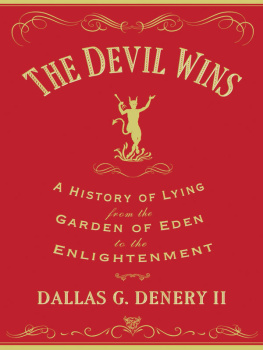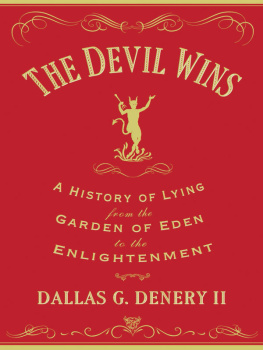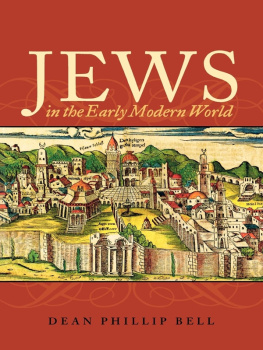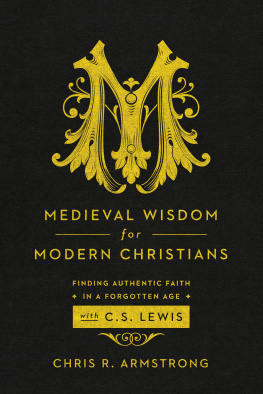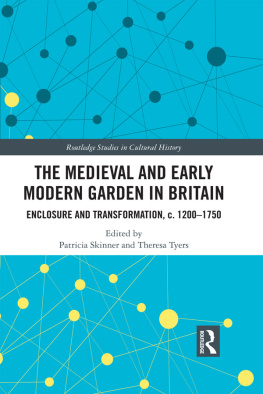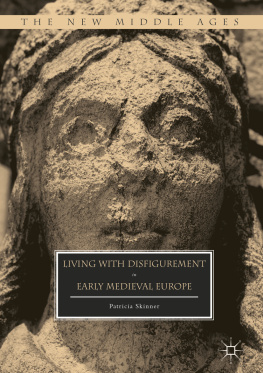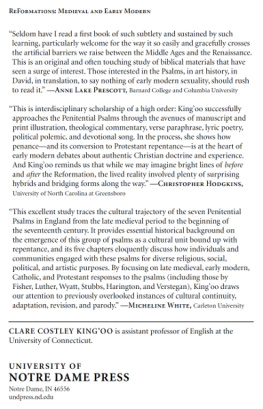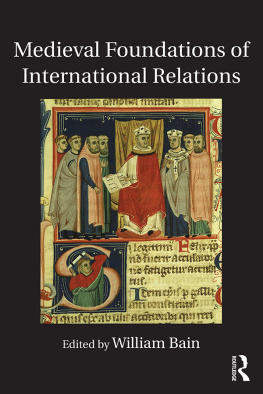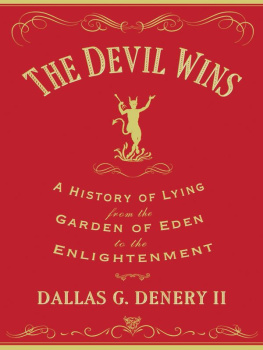
The Devil Wins

The Devil Wins

A HISTORY OF LYING from the GARDEN OF EDEN to the ENLIGHTENMENT

DALLAS G. DENERY II
Princeton University Press
Princeton and Oxford
Copyright 2015 by Princeton University Press
Published by Princeton University Press, 41 William Street, Princeton, New Jersey 08540
In the United Kingdom: Princeton University Press, 6 Oxford Street, Woodstock, Oxfordshire OX20 1TW
press.princeton.edu
Jacket art courtesy of briarpress.org. Jacket design by Pamela Schnitter
All Rights Reserved
Library of Congress Cataloging-in-Publication Data
Denery, Dallas G. (Dallas George), 1964
The devil wins : a history of lying from the Garden of Eden to the Enlightenment / Dallas G. Denery II.
pages cm
Includes bibliographical references and index.
ISBN 978-0-691-16321-5 (alk. paper)
1. Truthfulness and falsehood. I. Title.
BJ1421.D46 2014
177.309dc23 2014006311
British Library Cataloging-in-Publication Data is available
This book has been composed in 10/13.5 Sabon.
Printed on acid-free paper.
Printed in the United States of America
10 9 8 7 6 5 4 3 2 1
FOR LORRY
Contents

Acknowledgments

This book was a long time in the making and, before that, an even longer time in the putting off. Most of the doing and delaying occurred in three places, and I want to thank people from each of them.
Cambridge University has become a sort of home away from home. I owe a real debt of gratitude to Richard Newhauser, a great supporter and friend, who led an NEH seminar on the vices in medieval society at Darwin College during the summer of 2004. I began the preliminary research for this book that summer and profited from numerous conversations with Dwight Allman, Stan Benfell, Susan Dudash, Holly Johnson, Tom Parisi, and Derrick Pitard. In 2009, Nicolette Zeeman, along with Kantik Ghosh, Mishtooni Bose, and Rita Copeland, invited me to help organize a conference at Kings College on doubt and skepticism in the Middle Ages. The event allowed me to discuss my work with them, as well as with Hester Gelber, Christophe Grellard, Dominik Perler, and, especially, Eileen Sweeney, who has read various chapters with great care over the years. Two years later, Nicolette invited me back to present several chapters of my book at a three-day work-in-progress seminar during which I had very useful conversations with her, Bill Burwinkle, and Emily Corran. William D. Wood was kind enough to meet me for a beer in Oxford.
During the 20122013 academic year, I was a Laurance S. Rockefeller Fellow at the University Center for Human Values, Princeton University. Under Alan Pattens leadership, the Center was a convivial and lively place, and between the fellows and faculty at the Center, various other Princeton faculty, and an extraordinary number of visiting speakers, I incurred debts too many to recall. At the Center, I benefited particularly from numerous mobile conversations with Alexander Voorhoeve, as well as with Renate Blumenfeld-Kosinski, Kimberly Ferzan, Samuel Goldman, Christopher Heathwood, Bennet Helm, Nannerl Keohane, and the late, much beloved, Paul Sigmund. In addition, I had the pleasure to meet and talk things historical with Moshe Shluvosky and Sophie Lunn-Rockwell, both of whom were in residence at the Davis Center. I want to thank Rob Tempio at Princeton University Press for his early and continued enthusiasm for this book and books in general.
At Bowdoin College, a number of colleagues and friends have read and discussed various versions and stages of this book over the years, including Margaret Boyle, Mary Agnes Edsell, Paul Franco, Paul Friedland, Kristen Ghodsee, Page Herrlinger, Ann Kibbie, Aaron Kitch, Robert Morrison, Steve Perkinson, Patrick Rael, Meghan Roberts, Arielle Saiber, and Scott Sehon. It goes without saying that without our superb library staff this book would have been much more difficult to complete, but I must single out Guy Saldanha and everyone at Interlibrary Loan for their amazing facility at quickly tracking down even the most obscure material. Part of the research for this book was funded through a Kenan Family Research Grant, sponsored by the college. Georgia Whitaker and Maya Little helped construct the bibliography on very little notice. I must also thank seven years worth of seminar students who patiently and, hopefully, enjoyably, worked through a litany of biblical commentaries, court treatises, and theological quagmires as I struggled to figure out what this book would be about.
I want to thank Steven Justice and Stephen Lahey for commenting on early drafts, as well as Lisa Bitel, David Luscombe, Cary Nederman, Daniel Smail, and Nicholas Watson for their various kindnesses. I owe a real debt of gratitude to Jonathan Sheehan for his meticulous reading of the entire manuscript, the anonymous readers who reviewed the book for Princeton University Press, and Will Hively for his expert and attentive copyediting.
I dedicate this book to my wife Lorry.
A NOTE ON THE TEXT
I have incorporated parts of the following previously published essays into this book: From Sacred Mystery to Divine Deception: Robert Holkot, John Wyclif and the Transformation of Fourteenth Century Eucharistic Discourse, Journal of Religious History, June 2005, 12944; Biblical Liars and Medieval Theologians, in The Seven Deadly Sins: From Individuals to Communities, ed. Richard Newhauser (Leiden: E. J. Brill, 2007), 11128; Christine de Pizan against the Theologians: The Virtue of Lies in The Book of the Three Virtues, Viator: Medieval and Renaissance Studies 39:1 (2008): 22947; Christine de Pizan on Misogyny, Gossip and Possibility, in The Middle Ages in Texts and Texture, ed. Jason Glenn (Toronto: University of Toronto Press, 2011): 30921; and Uncertainty and Deception in the Medieval and Early Modern Court, in Uncertain Knowledge in the Middle Ages, ed. Dallas G. Denery II, Kantik Ghosh, and Nicolette Zeeman (Turnhout: Brepols, 2014): 1336.
The Devil Wins

INTRODUCTION
Is It Ever Acceptable to Lie?

Punishment awaits those who lie.
Dante had little doubt about this, little doubt that unrepentant liars would suffer an eternity of pain, and he devoted much of his early fourteenth-century masterpiece, the Inferno, to describing their torments. As the pilgrim Dante and his guide, the revered Roman poet Virgil, enter the eighth circle of hell, a place called Malebolge, the final, painful residence for the fraudulent and every type of falsifier, they witness flatterers stewing in dung that might well have been flushed from our latrines and seducers condemned for eternity to walk naked in endless circles as horned demons with enormous whips beat them from behind. Pausing for a moment, Virgil asks his companion to look at one of the figures, a disheveled woman wallowing in excrement, squatting then standing then squatting again, forever scratching herself raw with filth-encrusted fingernails. It is Thas, Virgil explains, the whore who gave this answer to her lover when he asked, Am I very worthy of your thanks?: Very, nay, incredibly so! Disgusted, Virgil urges his companion to hurry on: I think our eyes have had their fill of this.
Next page
